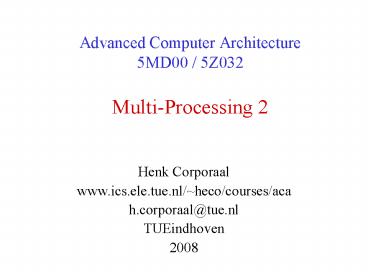Advanced Computer Architecture 5MD00 5Z032 MultiProcessing 2 PowerPoint PPT Presentation
1 / 21
Title: Advanced Computer Architecture 5MD00 5Z032 MultiProcessing 2
1
Advanced Computer Architecture5MD00 /
5Z032Multi-Processing 2
- Henk Corporaal
- www.ics.ele.tue.nl/heco/courses/aca
- h.corporaal_at_tue.nl
- TUEindhoven
- 2008
2
Multi-Processor design decision
- We have already discussed
- Shared memory versus Message passing
- Coherence, Consistency and Synchronization issues
- Other extremely important decisions
- Processing units
- Homogeneous versus Heterogeneous?
- Generic versus Application specific ?
- Interconnect
- Bus versus Network ?
- Type (topology) of network
- Focus on Performance, Power or Cost ?
- Memory organization ?
3
Homogeneous or Heterogeneous
- Homogenous
- replication effect
- memory dominated any way
- solve realization issuesonce and for all
- less flexible
4
Homogeneous or Heterogeneous
- Heterogeneous
- better fit to application domain
- smaller increments
5
Homogeneous or Heterogeneous
- Middle of the road approach
- Flexibile tiles
- Fixed tile structure at top level
6
Bus (shared) or Network (switched)
- Network
- claimed to be more scalable
- no bus arbitration
- point-to-point connections
- but router overhead
7
Historical Perspective
- Early machines were
- Collection of microprocessors.
- Communication was performed using bi-directional
queues between nearest neighbors. - Messages were forwarded by processors on path.
- Store and forward networking
- There was a strong emphasis on topology in
algorithms, in order to minimize the number of
hops minimize time
8
Design Characteristics of a Network
- Topology (how things are connected)
- Crossbar, ring, 2-D and 3-D meshes or torus,
hypercube, tree, butterfly, perfect shuffle .... - Routing algorithm (path used)
- Example in 2D torus all east-west then all
north-south (avoids deadlock) - Switching strategy
- Circuit switching full path reserved for entire
message, like the telephone. - Packet switching message broken into
separately-routed packets, like the post office.
- Flow control and buffering (what if there is
congestion) - Stall, store data temporarily in buffers
- re-route data to other nodes
- tell source node to temporarily halt, discard,
etc. - QoS guarantees
- error handling
- etc, etc.
9
Switch / Network Topology
- Topology determines
- Degree number of links from a node
- Diameter max number of links crossed between
nodes - Average distance number of links to random
destination - Bisection minimum number of links that separate
the network into two halves - Bisection bandwidth link bandwidth bisection
10
Bisection Bandwidth
- Bisection bandwidth bandwidth across smallest
cut that divides network into two equal halves - Bandwidth across narrowest part of the network
not a bisection cut
bisection cut
bisection bw link bw
bisection bw sqrt(n) link bw
- Bisection bandwidth is important for algorithms
in which all processors need to communicate with
all others
11
Common Topologies
Type Degree Diameter Ave Dist
Bisection 1D mesh 2 N-1 N/3 1 2D mesh
4 2(N1/2 - 1) 2N1/2 / 3 N1/2 3D mesh
6 3(N1/3 - 1) 3N1/3 / 3 N2/3 nD mesh
2n n(N1/n - 1) nN1/n / 3 N(n-1) / n Ring
2 N/2 N/4 2 2D torus 4 N1/2 N1/2 / 2 2N1/2
Hypercube Log2N nLog2N n/2 N/2 2D Tree
3 2Log2N 2Log2 N 1 Crossbar N-1 1 1
N2/2 N number of nodes, n dimension
12
Linear and Ring Topologies
- Linear array
- Diameter n-1 average distance n/3
- Bisection bandwidth 1 (in units of link
bandwidth) - Torus or Ring
- Diameter n/2 average distance n/4
- Bisection bandwidth 2
- Natural for algorithms that work with 1D arrays
13
Meshes and Tori
- Two dimensional mesh
- Diameter 2 (sqrt( n ) 1)
- Bisection bandwidth sqrt(n)
- Two dimensional torus
- Diameter sqrt( n )
- Bisection bandwidth 2 sqrt(n)
- Generalizes to higher dimensions
- Natural for algorithms that work with 2D and/or
3D arrays
14
Hypercubes
- Number of nodes n 2d for dimension d
- Diameter d
- Bisection bandwidth n/2
- 0d 1d 2d 3d
4d - Popular in early machines (Intel iPSC, NCUBE, CM)
- Lots of clever algorithms
- Greycode addressing
- Each node connected to
others with 1 bit different
110
111
010
011
100
101
001
000
15
Trees
- Diameter log n.
- Bisection bandwidth 1
- Easy layout as planar graph
- Many tree algorithms (e.g., summation)
- Fat trees avoid bisection bandwidth problem
- More (or wider) links near top
- Example Thinking Machines CM-5
16
Fat Tree example
- A multistage fat tree (CM-5) avoids congestion at
the root node - Randomly assign packets to different paths on way
up to spread the load - Increase degree near root, decrease congestion
17
Butterflies with n (k-1)2k switches
- Bisection bandwidth 22k
- Cost lots of wires
- 2log(k) hop-distance for all connections, however
blocking possible - Used in BBN Butterfly
- Natural for FFT
PE
multistage butterfly network k3
butterfly switch
18
Topologies in Real Machines
older newer
Many of these are approximations E.g., the X1 is
really a quad bristled hypercube and some of
the fat trees are not as fat as they should be at
the top
19
More examples
Hypercube
2D-Grid/Mesh
2D-Torus
Assume 64 nodes
20
QoS Quality-of-Service
- Hard and Soft Real-time applications require QoS
guarantees - Predicatable delays
- Guaranteed throughput
- Issues
- Different inter processor traffic service types
- GT guaranteed throughput / latency traffic
- BE best effort
- Resource manager
- interface between applications and platform
resources (processing elements, network, memory,
i/o) - Do we allow caches
- software controlled
21
Generic or Specialized?Intrinsic Computational
Efficiency

